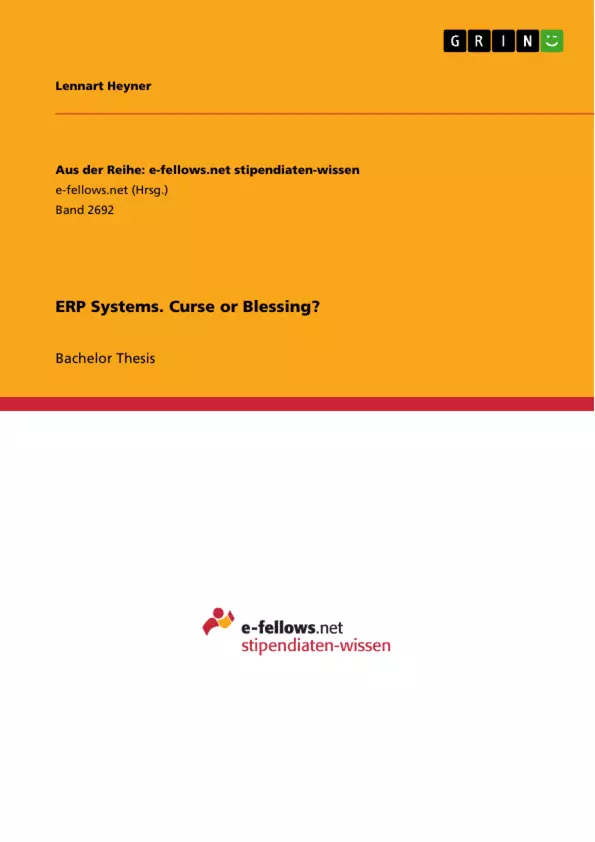In the era of increasing international network and economic systems, there is no question about the importance of information systems supporting operations, be it public institutions such as universities or companies. Due to rising complexity and interdependencies between stakeholders and socio-economic systems, the demand for tools to effectively manage organizational activities grows. One of the most known information systems in business environment for more than a decade is the Enterprise Resource Planning system (ERP).
Although ERP systems have existed for quite some time, there is still a great discussion going on whether this type of system proves beneficial or rather detrimental. Does an ERP represent a guarantee to competitive advantage or the beginning of the end of an enterprise: ERP systems – Curse or Blessing?
Inhaltsverzeichnis (Table of Contents)
- Introduction
- Enterprise Resource Planning System - Advantages and Disadvantages
- Advantages of Enterprise Resource Planning Systems
- Disadvantages of Enterprise Resource Planning systems
- Justifying ERP adoption at universities by Oliver & Romm (2002)
- Critical issues affecting an ERP implementation and its success
- Conclusion - Enterprise Resource Planning Systems: Curse or Blessing?
- References
- Appendix
Zielsetzung und Themenschwerpunkte (Objectives and Key Themes)
This paper examines the debate surrounding Enterprise Resource Planning (ERP) systems, specifically whether they represent a benefit or a detriment to organizations. The paper analyzes various viewpoints on ERP adoption, focusing on the advantages and disadvantages, justifications for implementation, and critical issues that can affect success.
- Advantages and disadvantages of ERP systems
- Justifications for ERP adoption, particularly in the context of universities
- Critical issues affecting ERP implementation and its success
- The potential benefits of ERP systems in improving organizational performance
- The potential drawbacks and challenges associated with ERP implementation
Zusammenfassung der Kapitel (Chapter Summaries)
- Introduction: This chapter provides an overview of the increasing importance of information systems in today's interconnected world, specifically highlighting the role of ERP systems. It introduces the central question of whether ERP systems represent a blessing or a curse for organizations.
- Enterprise Resource Planning System - Advantages and Disadvantages: This chapter explores the key features of ERP systems and examines their potential benefits. It highlights aspects such as improved data integration, enhanced interoperability, and potential improvements in productivity and quality.
- Justifying ERP adoption at universities by Oliver & Romm (2002): This chapter delves into the specific justifications for ERP adoption in the context of universities. It references the work of Oliver & Romm (2002) to explore the benefits of ERP implementation in this specific sector.
- Critical issues affecting an ERP implementation and its success: This chapter focuses on the challenges and critical issues that can influence the successful implementation of ERP systems. It discusses potential obstacles and provides insights into factors that can contribute to a successful implementation process.
Schlüsselwörter (Keywords)
The key terms and concepts explored in this paper include Enterprise Resource Planning (ERP) systems, information management, organizational performance, data integration, interoperability, implementation challenges, success factors, universities, and competitive advantage.
Frequently Asked Questions
What is an ERP system?
ERP stands for Enterprise Resource Planning, an integrated information system used to manage organizational activities and socio-economic interdependencies.
What are the main advantages of implementing an ERP?
Key benefits include improved data integration, enhanced interoperability between departments, and potential increases in productivity and quality.
Why do universities adopt ERP systems?
According to Oliver & Romm (2002), universities use ERPs to handle rising complexity and to support operations in an increasingly networked academic environment.
What are common disadvantages or risks of ERP systems?
Challenges include high implementation costs, complexity of the software, and the risk that the system might be detrimental to the enterprise if not managed correctly.
Is an ERP system a guarantee for competitive advantage?
The paper discusses this debate, suggesting that while it can offer advantages, it is not a guaranteed success and depends on critical implementation issues.
- Citar trabajo
- Lennart Heyner (Autor), 2015, ERP Systems. Curse or Blessing?, Múnich, GRIN Verlag, https://www.grin.com/document/413496



